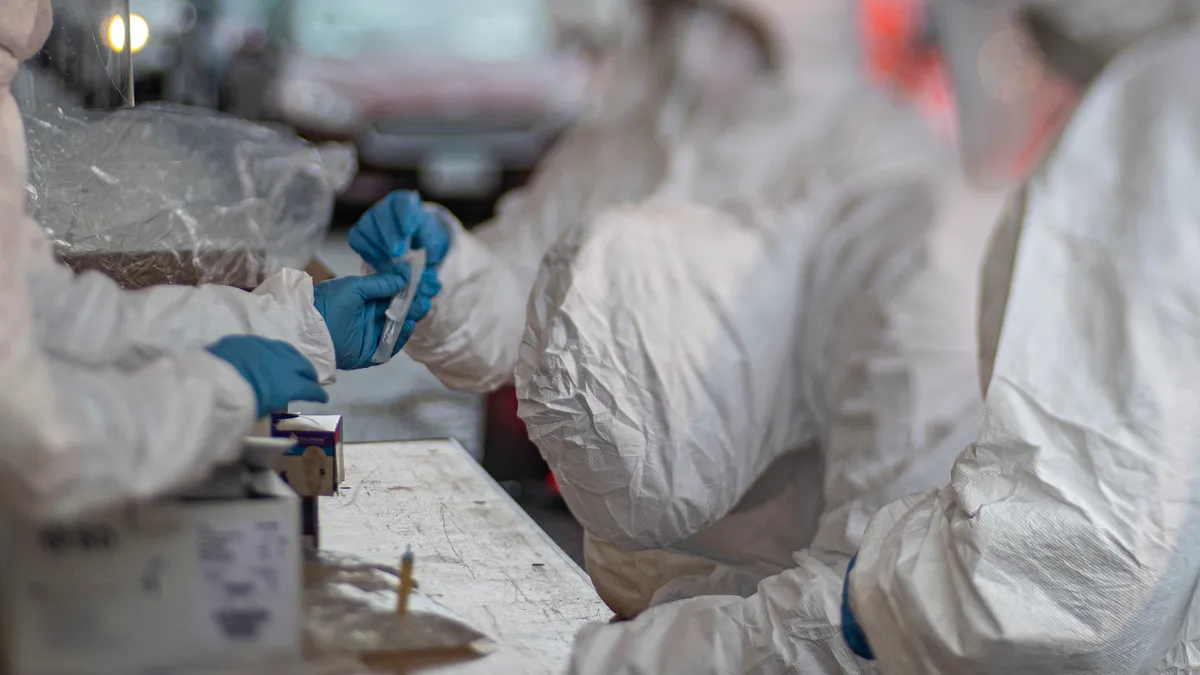Dive Brief:
- The U.S. market for coronavirus antibody testing may open up a multibillion dollar opportunity for Abbott, Roche and other players to vie for, Cowen analysts estimated in a report released Tuesday.
- Serological tests, which detect antibodies in the blood produced when the body is fighting infection, should be used not as the primary method to diagnose COVID-19, but to determine whether patients have been exposed to the virus, FDA has said.
- With tests typically priced between $5 and $25, the roughly 8.7 million people the U.S. Bureau of Labor Statistics say are employed as healthcare practitioners could equate to a $65 million market, not including possible repeat testing over time, the Cowen analysts said. Likewise, the population of more than 70 million students could be an approximately $500 million market. Even more broadly, if the total U.S. workforce of nearly 160 million people were to be screened, the opportunity could be worth $1.2 billion.
Dive Insight:
FDA is concerned about the reliability of some antibody tests and the potential for overuse in the fight against COVID-19. The tests alone can't diagnose the SARS-CoV-2 virus because antibodies may not yet be present in the early stages of an infection, when the immune system is first building a response.
However, identifying patients who have developed antibodies against COVID-19 infection can help to understand how the body's immune response to the virus develops and to determine how many people may have been infected. The Trump administration hopes serology testing can quickly become a tool for screening Americans to determine who has built immunity to the virus and who is still at risk as the country begins to ease quarantine restrictions.
FDA is collaborating with the National Cancer Institute, National Institute of Allergy and Infectious Diseases, and the Centers for Disease Control and Prevention to establish performance assessments for serological test developers.
The goal of the validation project is to identify well-performing tests among those already available for use and those not yet on the market. Results may be used to help determine whether FDA issues an emergency use authorization (EUA) for a developer's test, the agency said over the weekend in a statement.
FDA said it encourages test developers to request authorization through the EUA pathway because the designation assures healthcare providers and laboratories that the agency has reviewed the test. The agency has issued EUAs to Cellex, Chembio Diagnostic System, Mount Sinai Laboratory, and Ortho Clinical Diagnostics. The regulator is also working to make available EUA templates that labs and commercial manufacturers can use to prepare an authorization request.
Additional major companies have announced plans to pursue an EUA from FDA. DiaSorin said Friday it received Europe's CE Mark for its SARS-CoV-2 serological test and is submitting the product to FDA for an EUA. Roche also said it will seek an EUA for a serology test that it aims to have available by early May in countries that accept the CE mark. Siemens Healthineers is also working to develop a serology test for COVID-19.
Other companies, including Abbott and BD, launched antibody tests under FDA's diagnostic test policy unique to the COVID-19 public health emergency, although neither have yet received emergency use authorization from FDA.
For Abbott's already announced IgG-detecting test, which it hopes to distribute 20 million of monthly starting in June, the product could provide an additional $300 million in gross revenue per quarter, the Cowen analysts estimated.
For Roche, aiming to make a test available in May and produce “high double-digit millions” of tests per month by June, the quarterly revenue impact could be an additional $1.2 billion, the analysts calculated.
Last month, FDA issued a policy giving those making serological tests for use in patient care settings the go-ahead to market their tests without prior FDA review if the developer has validated the tests for accuracy and reliability, notified FDA, and labeled the tests properly. But it stressed that the EUA process or an evaluation by NIH supports greater confidence in test performance.
NIH performance assessments for serological tests will begin soon, with results expected shortly thereafter, FDA said. The agency said it may use NIH evaluation results to help assess whether to issue an EUA for a test.
The American Clinical Laboratory Association is urging the federal government to take the lead in scaling up and financing widespread SARS CoV-2 serologic testing. Providing the tests to roughly 70 million Americans, including frontline health workers, non-healthcare workers, college students and military service members would cost at least $25 billion, the association said.










